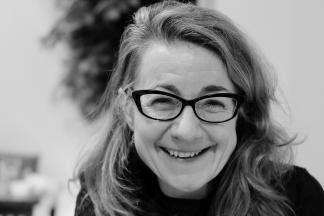Julia Adeney Thomas: "Nuclear Pain and Humanitarian Photography: Morizumi Takashi, the Gulf Wars, and Fukushima"

UMBC Humanities Forum
"Nuclear Pain and Humanitarian Photography: Morizumi Takashi, the Gulf Wars, and Fukushima"
Julia Adeney Thomas, Associate Professor of History, University of Notre Dame
Wednesday, November 15, 4 – 5:30 p.m.
Albin O. Kuhn Library Gallery
Can photography help us see suffering and end nuclear destruction? Photographer Morizumi Takashi hopes so. Linking three moments of atomic calamity – the Hiroshima atomic bombing, the depleted uranium-tipped weapons in the First Gulf War, and the Fukushima nuclear plant meltdown – Morizumi’s images attempt to find aesthetic leverage against the nuclearization of war and energy amid shifting political tensions. This lecture explores the ethics of sight and how humanitarian efforts are both enabled and circumscribed by the shifting situations in which a photographer works. Morizumi Takashi gained fame through his searing book, Children of the Gulf War (2002). His images depict Iraqi children harmed, as were Japanese children in 1945, by America’s nuclear weapons. Like Japanese children in Hiroshima and Nagasaki, the Iraqi children suffered hideously, innocently, and irreparably, damaged not by an atomic bomb but by the “depleted” uranium tipped weapons used by Americans in the First Gulf War (August 2, 1990 – February 28, 1991). With this work, Morizumi leveraged Japan’s status as the first victim of nuclear weapons to make a humanitarian plea against their use, but his ethical vision has gradually been compromised by Japan’s changing political posture in the Second Gulf War (The Invasion of Iraq) and by the triple-disaster of 3.11, which culminated in the Fukushima nuclear plant meltdown. In this lecture, Julia Adeney Thomas will trace these changes through Morizumi’s work, asking how photography might help us to understand suffering.
Julia Adeney Thomas has written extensively about concepts of nature in political ideology, the challenge posed by climate change to the discipline of history, and photography as a political practice in Japan and globally. She is the author of several books including Japan at Nature’s Edge: The Environmental Context of a Global Power (with Ian J. Miller and Brett L. Walker) and Reconfiguring Modernity: Concepts of Nature in Japanese Political Ideology, for which she was the recipient of the American Historical Association’s John K. Fairbank Prize. Currently, she is completing The Historian’s Task in the Anthropocene, as well as co-editing a collection entitled Visualizing Fascism: The Rise of the Global Right.
Admission is free.
Sponsored by the History Department; the Dresher Center for the Humanities; theAsian Studies Program; and the Center for Innovation, Research, and Creativity in the Arts. Funded by a grant from the Japan-U.S. Friendship Commission and the Northeast Asia Council of the Association for Asian Studies.